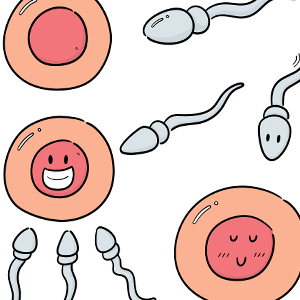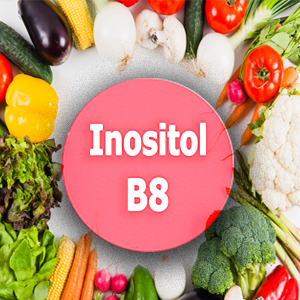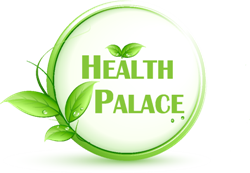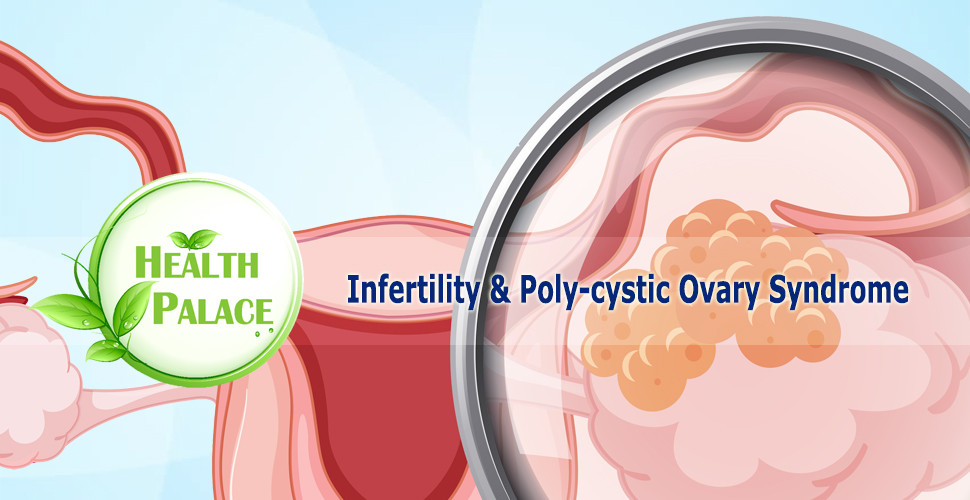Symptoms of Polycystic Ovarian Syndrome (PCOS) | Natural Supplements for PCOS
Infertility And Polycystic Ovary Syndrome (PCOS).
5-10 % of the women in childbearing age are affected by PCOS. PCOS is a hormonal condition with variety of signs and symptoms at different severity levels including irregular menstrual cycle, chronic lack of ovulation, enlarged ovaries, excess male hormone production which shows as facial hair, adult acne, and male pattern hair loss.
PCOS is one of the most common female endocrine conditions. The word “syndrome” is commonly used in medicine to describe varied signs and symptoms but does not indicate a precise cause of the condition.
Main conditions associated with PCOS are high blood sugar or diabetes due to increased insulin resistance, Increase LH, weight gain, depression, infertility. Also, women with PCOS are at much higher risk of developing cardiovascular disease.
Key Features Of PCOS:
PCOS causes hormonal imbalances, such as elevated testosterone (male hormone) and estrogen (female hormone), as well as increased insulin levels.
Irregular menstrual cycle which can take more than 35 days, or absent for a few months, and too little or heavy long periods.

Increased androgen levels is a key feature of PCOS, which may result in excess facial and body hair (hirsutism), adult acne and male-pattern baldness (in women). However, the physical signs of androgen excess vary with ethnicity. for example, the hirsutism is seen in at least 40% of European and American females, and it is even more common in darker skin types, while it may not affect the women of oriental descent.
Polycystic ovaries are enlarged ovaries with numerous small cysts that are detected by ultrasound. However, there are some women with the condition while their ovaries appear normal.
Infertility is one of the most common conditions caused by PCOS, as many women with polycystic ovary syndrome experience infrequent ovulation or lack of ovulation altogether . PCOS also is associated with spontaneous abortion and preeclampsia .
Obesity rate in women with PCOS is significantly higher; and about half of all women with PCOS manifest central obesity, in which there is a greater deposition of visceral fat around internal organs in the abdominal region. Accumulation of abdominal fat is associated with increased risk of hypertension, diabetes and lipid abnormalities.
Studies suggest that the insulin resistance and type 2 diabetes are at much higher level in women with PCOS than age and weight-matched controls. A great number of PCOS women is found to develop type 2 diabetes mellitus by the age of 40.
A skin condition known as Acanthosis nigricans which consists of dark, poorly defined, velvety dark patches found on the nape of the neck, armpits, inner thighs, vulva, or under the breasts , is in fact a sign of insulin resistance and higher circulating insulin levels.
How PCOS Is Diagnosed?
A standard diagnostic assessment for PCOS includes a full medical history, looking for signs and symptoms during a physical exam, a comprehensive hormonal tests, and ultrasound to detect "follicular arrest", or the development of small (5–7mm) follicles that never reach the pre-ovulatory size of 16 mm
Blood work is used to measure the levels of several hormones and to exclude the many possible causes of menstrual abnormalities or androgen excess that mimic PCOS. Along with tests used to measure elevated androgen levels, high levels of luteinizing hormones (LH) or an elevation in the ratio of LH to follicle stimulating hormone (FSH), prolactin, thyroid stimulating hormone (TSH), 17-hydroxyprogesterone, testosterone and DHEA-S, AMH, blood glucose level, cholesterol, and triglycerides are all considered.
 What Are The Causes & Risk Factors For PCOS?
What Are The Causes & Risk Factors For PCOS?
Anovulation (a menstrual cycle in which ovulation does not occur) and androgen excess have been considered the main diagnostic identifier for PCOS, however, insulin resistance is now considered as a significant contributor to the pathogenesis of PCOS.
Currently there are several contributing key factors to the development of PCOS:
Excessive production of LH triggers premature ovulation, disrupting the follicle’s maturation process and leading to an increase in androgen production by ovarian theca cells. Some research points to increased LH as the driving force for PCOS in slim and normal body-weight women.
High Insulin production also causes high androgen levels. Studies indicate that insulin acts synergistically with LH to enhance androgen production in ovarian theca cells; also Insulin directly and independently reduces the serum sex hormone-binding globulin (SHBG) resulting in more free blood androgen.
Since abnormal theca cells activity seems to be the primary source of excessive androgen production in PCOS, scientists suspect that there may be a genetic basis for PCOS.
An increase in LH, as well as high insulin levels both cause an increase in androgen production by ovarian theca cells. Scientists suspect that the changes in the ovaries, development of the cysts and theca cells' dysfunction seems may be an indication of a genetic basis for PCOS.
Some risk factors are considered to have a significant impact on the progression of PCOS. these risk factors are including; weight gain which is seemed to contribute to the development of PCOS, enlarged fat cells, not being able to regulate insulin, chronic inflammation, exposure to endocrine-disrupting chemicals, autoimmune disorders, especially those involving the ovaries, pancreas, thyroid and adrenal glands, the use of prolactin promoting treatments, and early puberty (under the age of 8).
How Natural Medicine Can Help?

Inositol is a sugar alcohol that comes in variety of forms. The Myo-inositol (MI) is the most common form, while D-chiro-inositol (DCI) makes up a small percentage. Some MI is converted to DCI in the body. Inositol supplementation contributes to improving hormonal and reproductive conditions in women. Inositol is found in cell membrain structure and plays an active role in cell to cell signalling, moreover it improves the insulin signaling.
PCOS participants who have taken Myo-inositol supplementation had improved insulin sensitivity, metabolic markers, reproductive hormone levels, restored menstrual cycles, improved quality and maturity of oocytes, and overall higher pregnancy rates. These improvement are dose dependant, the 4g daily Inositol with 400 mcg folate within 14 weeks produced better results than 1500 mg daily.
N-acetyl-cysteine (NAC) is an antioxidant which is used for production of glutathione, one of the body's most important natural antioxidants and detoxifiers. NAC helps to improve Insulin Sensitivity which is important for PCOS patients. The NAC treatment also helped to reduce testosterone levels and in free androgen in women with PCOS.
NAC may also be useful for improving fertility in women with PCOS. NAC when used in conjunction with infertility treatments improved ovulation rates. In a study of 573 women with PCOS, 52% of the participants who NAC with their regular treatment ovulated, whereas only 18% ovulated on the treatment alone.
Based on multiple studies and research, lipoic acid plays a critical role in maintaining optimal blood sugar levels (by helping the body use glucose), supporting insulin sensitivity. Lipoic acid helps relieve several aspects of metabolic syndrome. It helps to maintain healthy blood pressure and insulin resistance, improves lipid profile, and reduces weight. Therefore liopic acid has been considered to provide therapeutic benefits for those with metabolic syndrome.
Similarly, Lipoic acid at 600 mg twice daily has helped women with PCOS to improve their insulin sensitivity, and a reduction in triglycerides and LDL within 16 weeks.
Chromium is one of the most widely studied nutritional supplements for treatment of glucose and insulin-related irregularities. Chromium picolinate specifically is the form that has been used in a number of studies on insulin resistance. Chromium picolinate at 200 mcg/day improves glucose tolerance when compared with a placebo in women with PCOS.

Unique compounds in cinnamon bark where found to effectively increase sugar metabolism by 20 times in the lab, suggesting these compounds may function as antioxidants, enhancing insulin action, and may be beneficial to control of glucose intolerance and diabetes. Participants who took 1-6 grams of ground cinnamon lowered their fast blood sugar, serum triglycerides, LDL, and total cholesterol during 40 days. Similarly researchers at Columbia University found that cinnamon reduced insulin resistance in women with PCOS after 8 weeks, while it was not observed in placebo group.
Licorice root may help to down regulate androgen production and reduce serum testosterone in females. The authors of the study suggested that licorice could be considered to be used along with other treatments for hirsutism and polycystic ovary syndrome. These finding were further confirmed via follow up studies and it was found that the including licorice along with the routine treatment also helped to reduce the medical side effects of the treatment.
Researchers at Columbia University suggest that Vitamin D combined with calcium supplementation has helped to normalize and maintain menstrual cycles, and improve fertility rate of women with PCOS. It appears that abnormalities in calcium balance may be responsible, in part, for the poor follicular development in women with PCOS and contribute to its pathogenesis. Furthermore, those women with higher blood levels of vitamin D were much less likely to be insulin resistant.
Based on data often women with PCOS have significantly low serum and total magnesium which it could further contribute to the progression of insulin resistance to type 2 diabetes and heart disease. Supplementing with higher doses of magnesium (600 mg -1000 mg elemental magnesium) for 16 weeks combined with regular treatments and diet resulted in higher blood levels of magnesium and improved control of diabetes, as suggested by lower hemoglobin A1c (HbA1c) levels. Since magnesium improves insulin-mediated glucose uptake and insulin secretion in type 2 diabetes patients, it is considered a critical mineral for women with PCOS as well.

Diet and lifestyle:
Daily physical activity and exercise are essential part of treatments to help prevent insulin resistance, and to lower blood sugar, improve weight management, and to decrease testosterone.
A diet that is rich in fiber, vitamins, minerals , phytonutrients, and low in saturated fat is helpful to manage and prevent progression of the PCOS symptoms.
Monounsaturated fats help to increase insulin sensitivity and lower the overall glycemic index. High fiber foods are slowly absorbed, causing less insulin to be released. High fiber diets increase SHBG, which binds to and lowers free testosterone.
A moderate reduction in dietary carbohydrates contributes to lower fasting and post-challenge insulin concentrations among women with PCOS, and improved reproductive and endocrine outcomes.
Articles and products featured by Health Palace are collected from a variety of sources and are provided as a service by Health Palace. These newsletters, while of potential interest to readers, do not necessarily represent the opinions nor constitute the advice of Health Palace. Presented materials are only for information purposes and do not intent to treat, cure, or prevent any disease.
Related Articles:
Balanced Hormones and Women's Health
Natural Remedies for Hormonal Imbalance in Females
How to Relieve Yeast Infection Itch Naturally?
References:
- Dewailly D, Pigny P, Soudan B, et al. Reconciling the definitions of polycystic ovary syndrome: the ovarian follicle number and serum anti-Müllerian hormone concentrations aggregate with the markers of hyperandrogenism. J Clin Endocrinol Metab. 2010 Sep;95(9):4399-405.
- Diamanti-Kandarakis, E, et al. The role of genes and environment in the etiology of PCOS. Endocrine. 2006 August;30(1):19-26.
- Fica S, Albu A, Constantin M, Dobri GA. Insulin resistance and fertility in polycystic ovary syndrome. J Med Life. 2008 Oct-Dec;1(4):415-22.
- Ma YM, Li R, Qiao J, Characteristics of abnormal menstrual cycle and polycystic ovary syndrome in community and hospital populations. Chin Med J (Engl). 2010 Aug;123(16):2185-9.
- Schuring AN, Schulte N, Sonntag B, Kiesel L. Androgens and insulin--two key players in polycystic ovary syndrome. Recent concepts in the pathophysiology and genetics of polycystic ovary syndrome. Gynakol Geburtshilfliche Rundsch. 2008;48(1):9-15.
- Artini PG, Di Berardino OM, Simi G, Best methods for identification and treatment of PCOS. Minerva Ginecol. 2010 Feb;62(1):33-48.
- Azziz R, Carmina E, Dewailly D et al. Androgen Excess Society: Position statement: criteria for defining polycystic ovary syndrome as a predominantly hyperandrogenic syndrome: an Androgen Excess Society guideline. J Clin Endocrinol Metab 2006, 91:4237-4245.
- Badaway, A, State O, El Gawad S et al. Plasma homocysteine and polycystic ovary syndrome: The missed link. Eur J Obstet Gynecol Reprod Biol. 2007 March; 131(1):68-72.
- Faloia E, Canibus P, Gatti C, Frezza F, Santangelo M, GarrapaGG, Boscaro M. Body composition, fat distribution and metabolic characteristics in lean and obese women with polycystic ovary syndrome. J Endocrinol Invest. 2004 May;27(5):424-9.
- Moran LJ, Misso ML, Wild RA, Norman RJ. Impaired glucose tolerance, type 2 diabetes and metabolic syndrome in polycystic ovary syndrome: a systematic review and meta-analysis. Hum Reprod Update. 2010 Jul-Aug;16(4):347-63.
- Pellatt L, Rice S, Mason HD. Anti-Müllerian hormone and polycystic ovary syndrome: a mountain too high? Reproduction. 2010 May;139(5):825-33.
- Petríková J, Lazúrová I. Polycystic ovary syndrome and autoimmune diseases. Vnitr Lek. 2010 May;56(5):414-7.
- Armamani D, et al. Licorice reduces serum testosterone in healthy women. Steroids. 2004 October-November;69(11-12):763-766.
- Ciotta L, Stracquadanio M, Pagano I, Carbonaro A, Palumbo M, Gulino F. Effects of myo-inositol supplementation on oocyte's quality in PCOS patients: a double blind trial. European review for medical and pharmacological sciences. May 2011;15(5):509-514.
- Grundy SM. Obesity, metabolic syndrome, and coronary atherosclerosis. Circulation. 2002;105(23):2696–2698.
- Guzick DS. Polycystic ovary syndrome. Obstet Gynecol 2004;103:181-193.
- Wood JR, Nelson VL, Ho C, et al. The molecular phenotype of polycystic ovary syndrome (PCOS) theca cells and new candidate PCOS genes defined by microarray analysis. J Biol Chem. 2003 Jul 18;278(29):26380-90.
- Bremer AA and Miller WL. The serine phosphorylation hypothesis of polycystic ovary syndrome: a unifying mechanism for hyperandrogenemia and insulin resistance. Fertil Steril. 2008 May;89(5):1039-48.
- Gupta A, Jakubowicz D, Nestler JE. Pioglitazone Therapy Increases Insulin-Stimulated Release of d-Chiro-Inositol-Containing Inositolphosphoglycan Mediator in Women with Polycystic Ovary Syndrome. Metabolic syndrome and related disorders. Oct 2016;14(8):391-396.
- Lagana AS, Rossetti P, Buscema M, La Vignera S, Condorelli RA, Gullo G, . . . Triolo O. Metabolism and Ovarian Function in PCOS Women: A Therapeutic Approach with Inositols. International journal of endocrinology. 2016;2016:6306410.
- Artini PG, Di Berardino OM, Papini F, Genazzani AD, Simi G, Ruggiero M, Cela V. Endocrine and clinical effects of myo-inositol administration in polycystic ovary syndrome. A randomized study. Gynecological endocrinology : the official journal of the International Society of Gynecological Endocrinology. Apr 2013;29(4):375-379.
- Kamenov Z, Kolarov G, Gateva A, Carlomagno G, Genazzani AD. Ovulation induction with myo-inositol alone and in combination with clomiphene citrate in polycystic ovarian syndrome patients with insulin resistance. Gynecological endocrinology : the official journal of the International Society of Gynecological Endocrinology. Feb 2015;31(2):131-135.
- Unfer V, Nestler JE, Kamenov ZA, Prapas N, Facchinetti F. Effects of Inositol(s) in Women with PCOS: A Systematic Review of Randomized Controlled Trials. International journal of endocrinology. 2016;2016:1849162.
- Muscogiuri G, Palomba S, Lagana AS, Orio F. Inositols in the Treatment of Insulin-Mediated Diseases. International journal of endocrinology. 2016;2016:3058393.
- Bevilacqua A, Bizzarri M. Physiological role and clinical utility of inositols in polycystic ovary syndrome. Best practice & research. Clinical obstetrics & gynaecology. Nov 2016;37:129-139.
- Costantino D et al. Metabolic and hormonal effects of myo-inositol in women with polycystic ovary syndrome: a double-blind trial. Eur Rev Med Pharmacol Sci. 2009 Mar-Apr;13(2):105-10.
- Genazzani AD, Lanzoni C, Ricchieri F, JasonniVM. Myo-inositol administration positively affects hyperinsulinemia and hormonal parameters in overweight patients with polycystic ovary syndrome. Gynecol Endocrinol. 2008 Mar;24(3):139-44.
- Benelli E, Del Ghianda S, Di Cosmo C, Tonacchera M. A Combined Therapy with Myo-Inositol and D-Chiro-Inositol Improves Endocrine Parameters and Insulin Resistance in PCOS Young Overweight Women. International journal of endocrinology. 2016;2016:3204083.
- Cheang KI, Sistrun SN, Morel KS, Nestler JE. Effect on Insulin-Stimulated Release of D-Chiro-Inositol-Containing Inositolphosphoglycan Mediator during Weight Loss in Obese Women with and without Polycystic Ovary Syndrome. International journal of endocrinology. 2016;2016:7631804.
- Genazzani AD, Prati A, Santagni S, Ricchieri F, Chierchia E, Rattighieri E, . . . Artini PG. Differential insulin response to myo-inositol administration in obese polycystic ovary syndrome patients. Gynecological endocrinology : the official journal of the International Society of Gynecological Endocrinology. Dec 2012;28(12):969-973.
- Gerli S et al. Randomized, double blind placebo-controlled trial: effects of myo-inositol on ovarian function and metabolic factors in women with PCOS. Eur Rev Med Pharmacol Sci. 2007 Sep-Oct;11(5):347-54.
- Papaleo E et al. Myo-inositol in patients with polycystic ovary syndrome: a novel method for ovulation induction. Gynecol Endocrinol. 2007 Dec;23(12):700-3.
- Papaleo E, Unfer V, Baillargeon JP, Chiu TT. Contribution of myo-inositol to reproduction. Eur J Obstet Gynecol Reprod Biol. 2009 Dec;147(2):120-3.
- Fulghesu, AM, et al. N-acetyl-cysteine treatment improves insulin sensitivity in women with polycystic ovary syndrome. Fertil Steril. 2002 June; 77(6):1128-1135.
- Lucidi RS, et al. Effect of chromium supplementation on insulin resistance and ovarian and menstrual cyclicity in women with polycystic ovary syndrome. Fertil Steril. 2005 December; 84(6):1755-7.
- Rizk AY, Bedaiwy MA, Al-Inany HG. N-acetyl-cysteine is a novel adjuvant to infertility treatment -resistant patients with polycystic ovary syndrome. Fertil Steril. 2005 Feb;83(2):367-70.
- Masharani U, Gjerde C, Evans JL, Youngren JF, Goldfinel D.Effects of controlled-release alpha lipoic acid in lean, nondiabetic patients with polycystic ovary syndrome. J Diabetes Sci Technol. 2010 Mar 1;4(2):359-64.
- Pershadsingh HA. Alpha-lipoic acid: physiologic mechanisms and indications for the treatment of metabolic syndrome. Expert Opin Investig Drugs. 2007 Mar;16(3):291-302.
- Anderson RA, Broadhurst CL, Polansky MM, et al. Isolation and characterization of polyphenol type-A polymers from cinnamon with insulin-like biological activity. J Agric Food Chem. 2004 Jan 14;52(1):65-70.
- Cao H, Graves DJ, Anderson RA. Cinnamon extract regulates glucose transporter and insulin-signaling gene expression in mouse adipocytes. Phytomedicine. 2010 Nov;17(13):1027-32.
- Khan A et al. Cinnamon Improves Glucose and Lipids in People with Type 2 Diabetes. Diabetes Care. 2003;26:3215-18.
- Wang JG, et al. The effect of cinnamon extract on insulin resistance parameters in polycystic ovary syndrome: a pilot study. Fertil Steril. 2007 July;88(1):240-3. Epub 2007 Feb 12.
- Armanini D et al. Treatment of polycystic ovary syndrome with spironolactone plus licorice. Eur J ObstetGynecolReprod Biol. 2007 Mar;131(1):61-7.
- Vitd & calcium:
- Thys-Jacobs S, Donovan D, Papadopoulos A, et al. Vitamin D and calcium dysregulation in the polycystic ovarian syndrome. Steroids.1999 June;64(6):430-5.
- Wehr EB et al. Vitamin D-associated polymorphisms are related to insulin resistance and vitamin D deficiency in polycystic ovary syndrome. Eur J Endocrinol. 2011 Mar 9.
- De Lourdes Lima, M, Cruz T, PousadaJC, Rodrigues LE, Barbosa K, Canguco V. The effect of magnesium supplementation in increasing doses on the control of type 2 diabetes. Diabetes Care 1998 May; 21: 682-86.
- Kauffman RP, Tullar PE, Nipp RD, Castracane VD. Serum magnesium concentrations and metabolic variables in polycystic ovary syndrome. Acta Obstet Gynecol Scand. 2011 Jan 4. doi: 10.1111/j.1600-0412.2010.01067.x. [Epub ahead of print]
- Mooren FC, Kruger K, Völker S, Golf W, Wadepuhl M, Kraus A. Oral magnesium supplementation reduces insulin resistance in non-diabetic subjects – a double-blind, placebo-controlled, randomized trial. Diabetes, Obesity and Metabolism. 2011 March; 13 (3): 281-84.
- Rodriguez-Moran M, Guerrero-Romero F. Oral magnesium supplementation improves insulin sensitivity and metabolic control in type 2 diabetic subjects. Diabetes Care. 2003 April; 26:1147-52.
- Douglas CC, et al. Role of diet in the treatment of polycystic ovary syndrome. Fertil Steril. 2006 March; 85(3):679-88.
- Marsh K, et al. The optimal diet for women with polycystic ovary syndrome? Br J Nutr. 2005 August; 94(2):154-65.
- Kiddy DS, et al. Improvement in endocrine and ovarian function during dietary treatment of obese women with polycystic ovary syndrome. Clin Endocrinol. 1992 January;36(1):105-11.
Recent Posts
-
Macular degeneration
Macular degeneration which is commonly known as age-related macular degeneration (AMD /ARMD), is a m …7th Sep 2025 -
Maintain A Healthy Heart Rhythm With Integrative Medicine
Maintain A Healthy Heart Rhythm With Integrative Medicine;Usually, abnormal heart rate or arrhythmi …4th Feb 2021 -
How to Prevent Gallstones from Forming? | Natural Supplements for Gallstones
How To Prevent Gallstone Formation?Gallstones are hard deposits made of cholesterol or bilirubin f …4th Mar 2020



